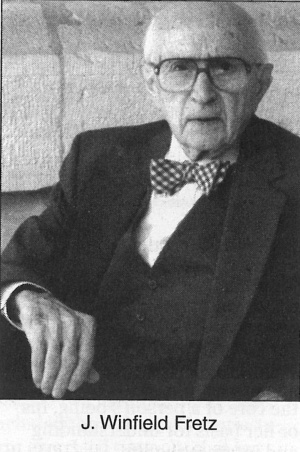If this site was useful to you, we'd be happy for a small donation. Be sure to enter "MLA donation" in the Comments box.
Fretz, Joseph Winfield (1910-2005)
Newton Kansan obituary: 2005 Jan 25 p. 2; 2005 Jan 29 p. 2
Birth date: 1910 Sep 29
Mennonite Weekly Review obituary: 2005 Feb 7 p. 3
text of obituary:
By Robert Rhodes
Mennonite Weekly Review
NORTH NEWTON, Kan. — J. Winfield Fretz, 94, the founding president of Conrad Grebel University College and a lifelong proponent of simple living, mutual aid and inter-Mennonite cooperation, died Jan. 24 after a brief illness.
Fretz was first president of Conrad Grebel university College in Waterloo, Ont., a position he held from 1963 to 1973. He was a professor of sociology at Bethel College in North Newton, 1942-63, and at the University of Waterloo (Ont.), 1963-79.
He was appointed act5ing president of Bethel in 1959, prior to helping found Conrad Grebel a few years later. After retiring, he served as acting president of Mennonite Biblical Seminary in Elkhart, Ind., in 1983-84.
Historian Robert S. Kreider of North Newton said Fretz was a unifier in the Mennonite world.
"He has made a highly significant contribution to inter-Mennonite collaboration, the nurture of an inter-Mennonite network," Kreider said. "If you're looking for the roots of Mennonite Church USA . . . . Winfield made a great contribution."
Kreider said Fretz's academic pursuits also helped define the study of Mennonite history and theology.
"He was at the beginning, the flowering, of Mennonite studies," Kreider said.
Fretz's interest in travel led to some of his most fruitful academic pursuits. During World War II he visited growing Mennonite settlements in Canada and wrote about them for Mennonite Central Committee.
Later, armed with Guggenheim and Fulbright fellowships during the 1950s, and again supported by MCC, Fretz traveled to South America, where he studied Mennonite settlements in Paraguay, Brazil, Argentina and Uruguay.
Two books, Pilgrims in Paraguay, and Immigrant Group Settlements in Paraguay, came from these journeys. Fretz also authored Mennonite Colonization in Mexico and Mennonite Colonization: Lessons from the Past for the Future, about other Anabaptists in Latin America.
In 1972, Fretz and his wife, Marguerite, took a six-month sabbatical trip around the world.
As a sociologist, Fretz explored economic and social systems and whether they could be compatible with religious faith. This led to his enthusiasm for rural living and mutual aid, which he expounded to students and colleagues alike.
Fretz took a special interest in farming cooperatives. As a graduate student, he studied several coops in Mountain Lake, Min., leading to his master's thesis on "Mutual Aid Among the Mennonites."
As a young professor at Bethel he advocated collective salary negotiations and come to be known as "Simple Life Fretz" for his desire to live on modest means.
In the 1950s, while he taught at Bethel, Frets opened a successful restaurant in downtown Newton, The guest House, which operated on the social and economic values he espoused. The restaurant was among the first in the area to offer equal service to African-American, Hispanic and other minority customers.

Fretz was a longtime contributor to Mennonite Weekly Review. He co-edited a full-page feature, "Mennonite Rural Life," during the 1940s. His column, "As I See It," reflected his belief in the importance of inter-Mennonite cooperation. In the Feb. 11, 1943 MWR he wrote:
"We believe that one of the weaknesses of Mennonites generally is that they have been greatly divided. It is our hope that, by means of information given on these pages, Mennonite people from all parts of the world will become more solidly united."
Historian Walter Klaassen of Saskatoon, Sask., among the first faculty members hired at Conrad Grebel, remembers Fretz's "enormous enthusiasm" for starting the college.
"He slept maybe four hours a night and the rest was work," Klaassen said.
Klaassen also noted Fretz's ability to work well with different Menonite groups.
"He was expert at it," Klaassen said. "His enthusiasm was infectious."
Joseph Winfield Fretz was born Sept. 29, 1910, at Bedminster, Pa., one of 11 children, and grew up on the family's farm. He attended a one-room schoolhouse through eighth grade and graduated from Lansdale (Pa.) High School.
He was a graduate of Bluffton (Ohio) College and received a bachelor of divinity degree at Chicago Theological Seminary. He earned master's and doctoral degrees in sociology at the University of Chicago. He received honorary doctorates from the University of Waterloo in1989 and from Bluffton in 1987.
He was preceded in death by his wife of 65 years, Marguerite Geiger Fretz, in 2002; a son, Burton D. Fretz, in 2001; and a granddaughter, Amy Kristine Fretz, in 1989.
Surviving are two sons, Stephen A. Fretz of Fresno, Calif., and Thomas H. Fretz of Olathe, Kan.; a daughter, Sara Fretz-Goering of Silver Spring, Md.; a sister, Gladys Diehl of Lansadale, Pa.; seven grandchildren and a great-grandchild.
A memorial service was held Feb. 3 in the College Chapel at Conrad Grebel.
Another memorial service will be held at 4 p.m. Feb 12 at Bethel College Mennonite Church.
Memorials may be made to Mennonite Central Committee or to the Burton D. Fretz Memorial fund, in care of the National Senior Citizens Law Center, Suite 400, 1101 14th St. NW, Washington, DC 20005.